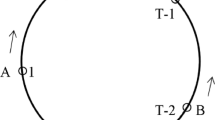Abstract
Establishing communications in a cognitive radio networks (CRNs) requires communicating nodes to “rendezvous” before transmitting their data packets. Channel hopping (CH) rendezvous algorithms can provide guaranteed rendezvous for CRNs without common control channels. A new rendezvous algorithm named adjusted disjoint finite cover rendezvous (ADFC-CH) is proposed, which can be used in more general cognitive radio networks such as synchronous clock, heterogeneous model, symmetric role, and anonymous information. The relationship between the concept in mathematics called disjoint finite cover (DFC) and rendezvous process is built in ADFC-CH. The ADFC-CH produces a channel sequence by constructing the DFC which is a function of network scale called LOCK. So the algorithm can be fit for the diversity of the network requirement by adjusting the value LOCK. Simulation results show that ADFC-CH can achieve better performance over the exiting channel hopping protocols such as SSB, L-DDP and DSCR.





Similar content being viewed by others
References
Mitola, J., & Maguire, G. Q. (1999). Cognitive radio: Making software radios more personal. IEEE Personal Communications, 6(4), 13–18.
Haykin, S. (2005). Cognitive radio: Brain-empowered wireless communications. IEEE Journal on Selected Areas in Communications, 23(2), 201–220.
Theis, N. C., Thomas, R. W., & DaSilva, L. A. (2011). Rendezvous for cognitive radios. IEEE Transactions on Mobile Computing, 10(2), 216–227.
Yang, B., Zheng, M., & Liang, W. (2016). A time-efficient rendezvous algorithm with a full rendezvous degree for heterogeneous cognitive radio networks. In IEEE INFOCOM 2016-The 35th annual IEEE international conference on computer communications (pp. 1–9). IEEE.
Jia, J., Zhang, Q., & Shen, X. S. (2008). HC-MAC: A hardware-constrained cognitive mac for efficient spectrum management. IEEE Journal on Selected Areas in Communications, 26(1), 106–117.
Wu, S.-L., Lin, C.-Y., Tseng, Y.-C., & Sheu, J.-L. (2000). A new multi-channel MAC protocol with on-demand channel assignment for multi-hop mobile ad hoc networks. In International Symposium on Parallel Architectures, Algorithms and Networks, 2000. I-SPAN 2000. Proceedings (pp. 232–237). IEEE.
Yoo, S.-J., Nan, H., & Hyon, T.-I. (2009). DCR-MAC: Distributed cognitive radio MAC protocol for wireless ad hoc networks. Wireless Communications and Mobile Computing, 9(5), 631–653.
Gu, Z., Pu, H., Hua, Q.-S., & Lau, F. C. M. (2015). Improved rendezvous algorithms for heterogeneous cognitive radio networks. In 2015 IEEE conference on computer communications (INFOCOM) (pp. 154–162). IEEE.
Lin, Z., Liu, H., Chu, X., & Leung, Y.-W. (2011). Jump-stay based channel-hopping algorithm with guaranteed rendezvous for cognitive radio networks. In INFOCOM, 2011 Proceedings IEEE (pp. 2444–2452). IEEE.
Lin, Z., Liu, H., Chu, X., & Leung, Y.-W. (2013). Enhanced jump-stay rendezvous algorithm for cognitive radio networks. IEEE Communications Letters, 17(9), 1742–1745.
Bian, K., Park, J.-M., & Chen, R. (2009). A quorum-based framework for establishing control channels in dynamic spectrum access networks. In Proceedings of the 15th annual international conference on mobile computing and networking (pp. 25–36). ACM.
Hossain, A., & Sarkar, N. I. (2015). Cross layer rendezvous in cognitive radio ad-hoc networks. In 2015 international telecommunication networks and applications conference (ITNAC) (pp. 149–154). IEEE.
Yu, L., Liu, H., Leung, Y.-W., Chu, X., & Lin, Z. (2015). Adjustable rendezvous in multi-radio cognitive radio networks. In 2015 IEEE global communications conference (GLOBECOM) (pp. 1–7). IEEE.
Mohapatra, S., & Sahoo, P. K. (2016). Asch: A novel asymmetric synchronous channel hopping algorithm for cognitive radio networks. In 2016 IEEE international conference on communications (ICC) (pp. 1–6). IEEE.
Reguera, V. A., Guerra, E. O., Souza, R. D., Fernandez, E. M. G., & Brante, G. (2014). Short channel hopping sequence approach to rendezvous for cognitive networks. IEEE Communications Letters, 18(2), 289–292.
Yang, B., Zheng, M., & Liang, W. (2015). Padded-dyck-path-based rendezvous algorithms for heterogeneous cognitive radio networks. In 2015 24th international conference on computer communication and networks (ICCCN) (pp. 1–8). IEEE.
Jia, J., & Zhang, Q. (2013). Rendezvous protocols based on message passing in cognitive radio networks. IEEE Transactions on Wireless Communications, 12(11), 5594–5606.
Sun, W., Yang, Z., Wang, K., & Liu, Y. (2014). Hello: A generic flexible protocol for neighbor discovery. In IEEE INFOCOM 2014-IEEE conference on computer communications (pp. 540–548). IEEE.
Wang, K. (2014). Multicast rendezvous in cognitive radio networks: A hypercube approach. In 2014 IEEE 17th international conference on computational science and engineering (CSE) (pp. 1175–1180). IEEE.
Acknowledgements
Project supported by the National Natural Science Foundation of China (Grants Nos. 61572435, 61472305,61473222), the Natural Science Foundation of Shaanxi Province (Grants Nos. 2015JZ002, 2015JM6311), the Natural Science Foundation of Zhejiang Province(No. LZ16F020001), Programs Supported by Ningbo Natural Science Foundation-Grant No. 2016A610035 and AreoSpace T.T.&.C. Innovation Program (No. KJCK1608).
Author information
Authors and Affiliations
Corresponding author
Rights and permissions
About this article
Cite this article
Qi, X., Gao, R., Liu, L. et al. ADFC-CH: adjusted disjoint finite cover rendezvous algorithms for cognitive radio networks. Wireless Netw 24, 2621–2630 (2018). https://doi.org/10.1007/s11276-017-1489-y
Published:
Issue Date:
DOI: https://doi.org/10.1007/s11276-017-1489-y




